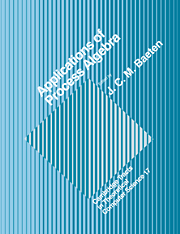Book contents
- Frontmatter
- Preface
- Contents
- An introduction to process algebra
- Two simple protocols
- Proving mutual exclusion with process algebra
- Process algebra as a tool for the specification and verification of CIM-architectures
- A process creation mechanism in process algebra
- Correctness proofs for systolic algorithms: palindromes and sorting
- Verification of an algorithm for log-time sorting by square comparison
- On the Amoeba protocol
- Process algebra semantics of POOL
- Some observations on redundancy in a context
- A modular approach to protocol verification using process algebra
- Index of concepts
- Index of names
- Index of symbols and notation
Verification of an algorithm for log-time sorting by square comparison
Published online by Cambridge University Press: 03 December 2009
- Frontmatter
- Preface
- Contents
- An introduction to process algebra
- Two simple protocols
- Proving mutual exclusion with process algebra
- Process algebra as a tool for the specification and verification of CIM-architectures
- A process creation mechanism in process algebra
- Correctness proofs for systolic algorithms: palindromes and sorting
- Verification of an algorithm for log-time sorting by square comparison
- On the Amoeba protocol
- Process algebra semantics of POOL
- Some observations on redundancy in a context
- A modular approach to protocol verification using process algebra
- Index of concepts
- Index of names
- Index of symbols and notation
Summary
In this paper a concurrent sorting algorithm called ranksort is presented, able to sort an input sequence of length n in log n time, using n2 processors. The algorithm is formally specified as a delay-insensitive circuit. Then, a formal correctness proof is given, using bisimulation semantics in the language ACPτ. The algorithm has area-time2=O(n2 log4n) complexity which is slightly suboptimal with respect to the lower bound of AT2 = Ω(n2 log n).
INTRODUCTION
Many authors have studied the concurrency aspects of sorting, and indeed the n-time bubblesort algorithm (using n processors) is rather thoroughly analyzed already (e.g. see: Hennessy, Kossen and Weijland). However, bubblesort is not the most efficient sorting algorithm in sequential programming, since it is n2-time and for instance heapsort and mergesort are n log n-time sorting algorithms. So, the natural question arises whether it would be possible to design an algorithm using even less than n-time.
In this paper we discuss a concurrent algorithm, capable of sorting n numbers in O(log n) time. This algorithm is based on the idea of square comparison: putting all numbers to be sorted in a square matrix, all comparisons can be made in O(1) time, using n2 processors (one for each cell of the matrix). Then, the algorithm only needs to evaluate the result of this operation.
The algorithm presented here, which is called ranksort, is not the only concurrent time-efficient sorting algorithm. Several sub n-time algorithms have been developed by others (see: Thompson).
- Type
- Chapter
- Information
- Applications of Process Algebra , pp. 127 - 146Publisher: Cambridge University PressPrint publication year: 1990

